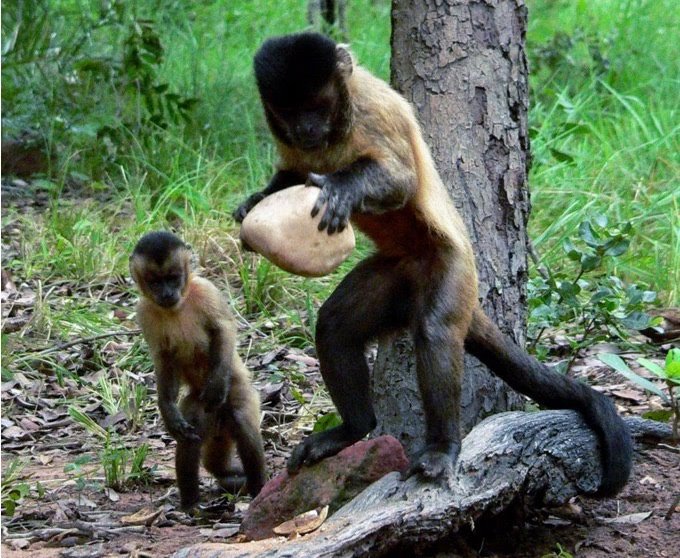The cultural tradition of bearded strains, South American monkeys who use tools, risks disappearing due to the agricultural conversion of forest areas. The alarm was launched by a study conducted in collaboration between the Cnr Institute of Sciences and Technologies of Cognition and the University of Salisbury (USA), which proposes a new criterion for the protection and conservation of endangered species.
The intelligence of the strains is, in many respects, equal to that of the chimpanzees, the primate evolutionarily closest to the human species. In the Fazenda Boa Vista in southern Piauí, a state in northeastern Brazil, the bearded strains (Sapajus libidinosus) use heavy strikers and stone anvils to break the very hard shell of the palm nuts. While the stumps that live in the mangroves of Morro do Boi, Maranhão state about 1,200 km further north, use wooden tools to open molluscs and crabs.
But animal traditions are increasingly threatened by human impact on natural habitats, as a study by Andréa Presotto, researcher at the US university of Salisbury (USA) conducted with the collaboration, among others, of Elisabetta Visalberghi and Noemi Spagnoletti of ‘Institute of science and technologies of cognition of the National Research Council (Cnr-Istc) and published in the International Journal of Primatology.
“These monkeys learn to use stone or wood tools strategically by taking part in the life of the group, from one generation to the next. Their behaviors are socially transmitted, they are acquired by young people who participate daily in the activities of the most experienced members of the group, but take years and years to learn, “explains Visalberghi, primatologist Cnr-Istc.
“Unfortunately, Piauí and Maranhão are located in an area affected by an agricultural expansion plan started thirty years ago, which is rapidly reducing its biodiversity, endangering the survival of many animal species,” says Presotto, biogeographer of the Salisbury University.
“In the study, we analyzed satellite images of Fazenda Boa Vista: in 1987 there was no farmland, while we experienced a drastic change between 2000 and 2017, with an increase in arable areas of over 350%. Projections to 2034 predict a further decrease in wet and rocky areas due to soil erosion. In Morro do Boi the situation is no better. Already in 1987, 2% of the area had been converted to agriculture, but between 2000 and 2017 intensive agriculture increased by 323% and the simulation indicates that in 2034 half of the mangrove forest will be converted and / or degraded “.

“Habitat degradation threatens the survival of these strain populations and their cultural traditions, which are unique. The use of tools depends not only on environmental conditions, such as the availability of palm fruits and the presence of rocks to be used as anvils, but also on the traditions developed only by some populations “, reiterates Spagnoletti, a primatologist who collaborates with the cNR-Istc.
“The criteria used so far to plan the interventions of species conservation policies concern genetic diversity and numerical consistency. Today it becomes fundamental to consider whether a certain population has cultural traditions not present elsewhere: the same logic that applies to the protection of human populations that risk disappearing. The Sapajus libidinosus who live in Fazenda Boa Vista have many traditions absent elsewhere that we cannot afford to lose. “
“Protecting animal populations with unique cultural knowledge is as important as protecting the habitat in which the species lives,” continues Visalberghi. “Two articles published in Science in 2019 by Philippa Brakes of the University of Exeter and Hjalmar Kühl of the Max Planck Institute for Evolutionary Anthropology, with their collaborators, illustrate this concept with various examples. In matriarchal groups of elephants, the more experienced adult females are the reference point of the group: a plan to protect this species should therefore focus on adult females rather than on young ones. And as far as chimpanzees are concerned, man destroys, with the natural resources where they live, also the social learning processes of their cultural behaviors “.
The “Save the culture of the cells” service, created with the collaboration of the Cnr-Istc, will take care of these very special monkeys, which will be aired this evening, July 29, in the Rai1 Superquark program.